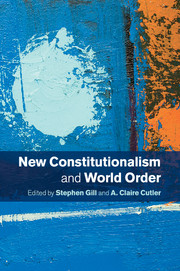Book contents
- Frontmatter
- Contents
- List of Figures
- List of Contributors
- Acknowledgements
- List of Acronyms
- 1 New constitutionalism and world order
- Part I Concepts
- Part II Genealogy, origins and world order
- Part III Multilevel governance and neo-liberalization
- Part IV Trade, investment and taxation
- Part V Social reproduction, welfare and ecology
- Part VI Globalization from below and prospects for a just new constitutionalism
- 17 Constitutionalism as critical project
- 18 New constitutionalism and geopolitics
- Glossary
- Appendix
- Bibliography
- Index
17 - Constitutionalism as critical project
The epistemological challenge to politics
from Part VI - Globalization from below and prospects for a just new constitutionalism
Published online by Cambridge University Press: 05 February 2014
- Frontmatter
- Contents
- List of Figures
- List of Contributors
- Acknowledgements
- List of Acronyms
- 1 New constitutionalism and world order
- Part I Concepts
- Part II Genealogy, origins and world order
- Part III Multilevel governance and neo-liberalization
- Part IV Trade, investment and taxation
- Part V Social reproduction, welfare and ecology
- Part VI Globalization from below and prospects for a just new constitutionalism
- 17 Constitutionalism as critical project
- 18 New constitutionalism and geopolitics
- Glossary
- Appendix
- Bibliography
- Index
Summary
Introduction
This chapter addresses the significance of critical perspectives on new constitutionalism [hereafter constitutionalism as critique (Schneiderman 2010)] as a new terrain of knowledge from the perspective of constitutional theory. It matters how we talk about constitutionalism as it operates at two different levels – it not only provides the basic rules and procedures that govern the exercise of political power (Lane 1996: 4), but it also, and more fundamentally, embodies foundational principles of societal organization (Teubner 2004), providing the framework for how these are made, and moreover, transformed. This chapter will therefore initially focus upon these underlying foundational dimensions of constitutional discourse, rather than new constitutionalism as it is referred to elsewhere in this book as a concrete set of neo-liberal procedures, processes and structures within capitalist societies. It then introduces the emancipatory and novel epistemological perspectives on constitutionalism associated with theories emanating from the global South, sometimes referred to as ‘globalization from below’. It is argued that constitutionalism as critique is enriched and politically strengthened by the new forces and movements associated with these novel epistemological perspectives, which enable a new approach to the construction of foundational principles.
A key aspect of this enterprise addresses the continuities between old and new forms of constitutionalism. Thus, constitutionalism as critique emphasizes how the separation between the economic and the political characterizes new constitutionalism, a separation that was fundamental to the operation of liberal constitutionalism within the nation state, and that now is taken to a zenith by neo-liberalism. Neo-liberalism seeks to remove processes of marketization and commodification from political contestation and constitutional revision globally, thus removing the market from greater democratic control, taking further, on transnational and global levels, the processes of commodification documented extensively by Karl Polanyi in The Great Transformation, when capitalist market society was being established in the nineteenth century at the national level in England. The manner by which critical constitutional theory seeks to re-establish questions of (global) political economy at the heart of constitutional discourse is elaborated in the first section below.
- Type
- Chapter
- Information
- New Constitutionalism and World Order , pp. 281 - 294Publisher: Cambridge University PressPrint publication year: 2014
- 9
- Cited by



